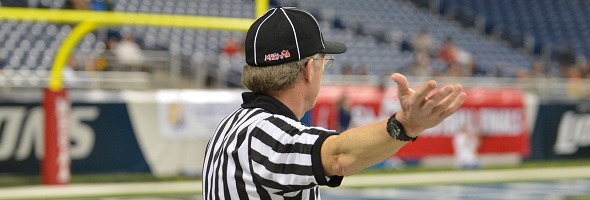
Be the Referee: Trick Plays
November 19, 2015
This week, MHSAA assistant director Mark Uyl explains which trick plays in football are allowed, and not allowed, under high school rules.
Be The Referee is a series of short messages designed to help educate people on the rules of different sports, to help them better understand the art of officiating, and to recruit officials.
Below is this week's segment - Trick Plays - Listen
In some of the biggest football games of the year, often times a trick play can be the difference between winning and losing.
Many types of these trick plays are perfectly legal – the halfback pass, the hook and ladder, or the double pass with the first pass being backward behind the line of scrimmage and the second pass going forward. There are several types of trick plays, however, that are prohibited by rule.
One is the old fumblerooski play, where a team intentionally fumbles near the center and a lineman picks up the ball and advances. A second type that is illegal is whenever you’re using substitutions or pretended substitutions to free up a receiver or player standing out along the sidelines.
Past editions:
Nov. 12: 7-Person Football Mechanics - Listen
Nov. 5: Make the Call: Personal Fouls - Listen
Oct. 29: Officials Demographics - Listen
Oct. 15: Make the Call: Intentional Grounding - Listen
Oct. 8: Playoff Selection - Listen
Oct. 1: Kick Returns - Listen
Sept. 24: Concussions - Listen
Sept. 17: Automatic First Downs - Listen
Sept. 10: Correcting a Down - Listen
Sept 3: Spearing - Listen
Aug. 27: Missed Field Goal - Listen

Be the Referee: Football Rules Changes
September 5, 2019
This week, MHSAA Assistant Director Brent Rice discusses a pair of football rules changes made the enhance safety.
Be The Referee is a series of short messages designed to help educate people on the rules of different sports, to help them better understand the art of officiating, and to recruit officials.
Below is this week's segment - Football Safety Rules Changes - Listen
Among our football rules changes for this year are two which involve player safety.
The foul for tripping has been expanded to include a trip on the ball carrier. Intentionally tripping any player on the field – using the lower leg or foot to obstruct an opponent below the knees – will result in a 15-yard penalty.
And the definition of a horse-collar tackle has been expanded to include bringing down a runner backwards or sideways by grabbing the nameplate area on the back of the jersey – or inside the neck area of the jersey or shoulder plate. The penalty for a horse-collar tackle is 15 yards.
Past editions
Aug. 29: 40-Second Play Clock - Listen

